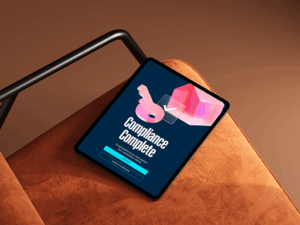In this third post of our digital property market series, we explore the role of tokenised money and titles in shaping a truly digital property market. We take a closer look at the limitations set by the current process, including the amount of manual intervention that still takes place today, and how only with fully digital money and titles can we progress to where the market wants, and needs, to be.
Two worlds are coalescing in the property market; the analogue and the digital. Navigating this in our industry is tricky, particularly when operations that appear digital on the surface are plagued by human intervention and manual processes, which can pose an unsettlingly high level of risk.
Let’s take a moment to think about what commonly happens on completion day, when the transfer of money and property ownership takes place. Bank details and other key pieces of financial information are sent in separate PDFs over email and coordination is often patchy at best between the people involved; the broker, bank, conveyancer, and consumer. Now let’s add to the mix the fact that the buyer is sending huge sums of money without necessarily the confidence it’s going to the right place. It’s 2023, it shouldn’t be this much of a pain.
Now imagine a completely digital completion day. Managed automatically and with all parties having sight of how (and most importantly when) the money and titles are being transferred safely and securely from one to another. For this to work we need money and titles in a fully digital state, not the semi-digital versions we have today.
In this blog we’ll explore this fully digital state for titles and assets (tokenisation), where we are now, and what needs to be done to make them work in a fully digital property market.
Behind the scenes it’s digital in name only
Money isn’t as digital as we think
Given the sheer number of contactless payments we all make on a daily basis, you’d be forgiven for thinking that the process of transferring money wasn’t completely digital already.
With property transactions in particular, when the sums of money in question are significantly larger, the movement of money is slow, sequential, and requires lots of manual intervention. Lining up the movement of funds through the chain on completion day is consistently referred to as one of the most painful, and nerve-wracking, parts of the process.
If that wasn’t bad enough, because conveyancers end up holding vast sums of money in their accounts before the money is eventually dispersed, and email is often the de-facto tool of communication, they are one of the biggest targets for fraud. In 2022, HM Land Registry (HMLR) recorded an increase in the number of attempted property frauds up to 84% compared to the five previous years.
PDF titles aren’t digital either
It’s much the same story, if not worse, when it comes to titles. Despite recent history seeing in 2003 the dematerialisation of titles (Land Registration Act 2002), this shift from paper certificates to ‘digitised’ titles held in the Land Registry’s electronic register was digital in name only.
The PDF titles stored on the electronic register are essentially pieces of digital information that are still trapped in a manual process. Not only can you not call a process truly digital when the output is a PDF of a physical document, but the fact that the process still requires so much human intervention to update and monitor for modifications, means the process remains incredibly manually intensive to keep the register accurate.
To put this into more perspective, on a daily basis there are around 18,000 applications to update the register. Every day, 1 in 5 applications (more than 3,500), have missing, incomplete, or inaccurate information. The requisition of which then causes extensive delays that radiate out through the rest of the transaction.
If digitisation is treated as a half-baked solution, nothing is truly feeding the system. Something needs to change.
Money and titles need to be fully digital
Money and titles in their current form, trapped in siloed databases, are cumbersome and outdated. The property market needs a more secure, easily transferable, and digital-first solution.
One of the suggested options to elevate money and titles to a fully digital state is through tokenisation. Tokenised assets are blockchain-based tokens that represent the ownership over particular physical and digital assets, i.e., someone’s ownership of a property can be represented on a digital title if it’s tokenised. The benefits include:
- Updating the registry is automated, reducing delays from multiple update applications.
- Many manual processes are eliminated enabling seamless transactions.
- Improved security as transactions take place over a secure (blockchain) network
The good news is, there has been progress in tokenised money, with the Bank of England laying the groundwork for a digital pound. Furthermore, HMLR continues to commit to progressing research on tokenisation. It’s no longer a question of if, it is more a question of when we will have a tokenised money and titles. There is momentum in this space, including Project Meridian, the prototype Coadjute collaborated on with the Bank of England earlier in 2023. And major financial institutions like Mastercard are moving even faster, putting tokenised payment networks firmly into the short term.
We’re closer to a digital property market than ever before
Project Meridian from the BIS Innovation Hub and the Bank of England looked at how financial technology could improve transactions for a wide range of assets, namely in this case, the complex process of buying a house. The prototype that Coadjute helped to build proved that you could simultaneously coordinate the transfer of money and house ownership, made possible by reserving funds in the buyer’s account and the introduction of a digital title that was time stamped at the point of settlement. It goes without saying that there could be a huge impact on the property market should this infrastructure be adopted:
Automated processes save time
Slow and frustrating paper trails are replaced with faster digital procedures, by digitising the workflow such that the information required at settlement is a prerequisite for starting settlement. Gone would be the days of exchanging paper-based or pdf documents right up until completion, reducing delays and costly mistakes. Documents are electronically signed passing ownership of the property to the buyer and the digital deed reflects the changes at the land registry.
Transparency right across the transaction
The best way to overcome uncertainty is by having more transparency of the moving parts of the transaction. The prototype automates this whole process and provides complete transparency for all the parties involved, meaning the lack of clarity and insufficient communication that we all know is a problem with the current system is removed. Everybody in the transaction is kept updated as it progresses.
Keep your money safe by knowing exactly where it goes
We know how terrifying it is when the moment comes to send your deposit, often a collection of a person’s life savings, into the ether on exchange or completion day. By holding and earmarking the funds required for settlement, the prototype removes the need of doing banking over the phone or email with the conveyancer. As a result, buyers no longer have to wonder ‘have I actually bought that house yet?’
The digital property market is starting to come together
The current system, while partially digitised, falls short of the potential offered by a fully digital property market. Fully digital money and titles would make these elements of the process fully digital themselves, enabling seamless and secure property transactions.
The achievements of the Project Meridian prototype are incredibly exciting and should act as a catalyst for industry participants to streamline the transaction process by supporting further innovation.
There is certainly room for optimism, given the recent explorations into tokenisation undertaken by organisations like the Bank of England, HM Land Registry and Mastercard. Add to this the robust digital framework provided by the Coadjute network and you have the building blocks for a fully digital property market in the not-too-distant future.


